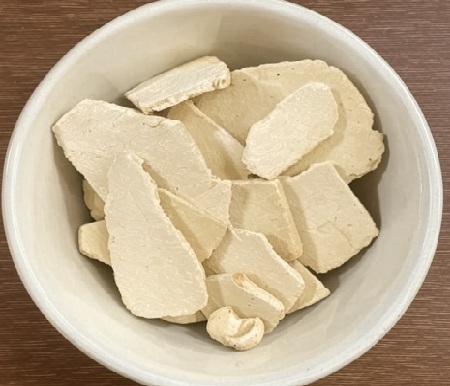Poria Mushroom (Tuckahoe Mushroom)

Poria (Fu Ling): A Neutral Herb for Dampness, Digestion, and Calm
Introduction
Poria, known as Fu Ling (茯苓) in Traditional Chinese Medicine (TCM), is a neutral, mild herb used to promote urination, drain dampness, strengthen the spleen, and calm the mind. Made from the sclerotium of a type of fungus that grows on pine roots, this herb is favored for its gentle ability to resolve internal dampness without being drying or harsh. Its sweet and bland taste, combined with a neutral temperature, makes it highly versatile and widely used in both tonic and draining formulas.
What Is Poria?
Fu Ling refers to the dried fungal body of Wolfiporia extensa, a subterranean fungus traditionally gathered from under pine trees. In TCM, it is classified as sweet, bland, and neutral, and it enters the Heart, Spleen, Lung, and Kidney meridians. It is best known for promoting urination and leaching out dampness, supporting spleen function, and calming the shen (spirit). It is used in formulas for water retention, poor digestion, edema, and restlessness.
Health Benefits of Poria
1. Promotes Urination and Drains Dampness
Fu Ling helps eliminate excess fluid from the body and is used in cases of edema, urinary difficulty, or fluid accumulation.
2. Strengthens the Spleen and Supports Digestion
It improves appetite, reduces bloating, and helps with loose stools—especially in cases of spleen qi deficiency with damp accumulation.
3. Calms the Shen (Spirit)
Poria has a mild sedative effect, making it helpful for insomnia, anxiety, or palpitations caused by dampness affecting the heart.
4. Enhances the Effectiveness of Tonic Herbs
Due to its gentle nature, it is often included in qi or yin tonic formulas to support digestion and prevent cloying effects from richer herbs.
How to Use Poria
1. In Soups and Congee
Add 9–15 grams of Fu Ling to herbal broths or rice congee to gently support digestion and drain excess fluid. It pairs well with herbs like Bai Zhu, Chen Pi, or Chinese yam.
2. In Herbal Decoctions
Simmer with other herbs in formulas like Si Jun Zi Tang to tonify the spleen and reduce dampness. Use long, slow boiling to extract its polysaccharides.
3. In Powder or Pill Form
Available in many traditional formulas as granules or pills, especially those aimed at digestion, calm, and dampness.
Where to Buy Poria
Fu Ling can be found at Chinese herb shops, TCM dispensaries, and online health stores specializing in herbal medicine.
Look for:
- Pale white to pinkish chunks or cubes
- Light, earthy aroma
- Lab-tested or organic sources preferred for purity
Are There Any Side Effects?
Poria is very gentle and well-tolerated. It is considered one of the safest herbs in the TCM pharmacopeia. However, overuse without addressing the root cause of dampness may yield limited results.
Conclusion
Poria (Fu Ling) is a neutral, adaptable herb that excels in resolving dampness, supporting digestion, and calming the mind. Whether used for water retention, digestive sluggishness, or emotional restlessness, Fu Ling offers a subtle yet effective path to restoring internal balance.
FAQs
Can I take Poria daily?
Yes, it is mild enough for daily use, especially in tonic soups or formulas.
Is Poria a mushroom?
Technically, yes—it is a fungus, though it looks more like a starchy root than a typical mushroom.
Does it have a taste?
It has a bland, mildly sweet flavor that makes it easy to incorporate into both food and herbal teas.

